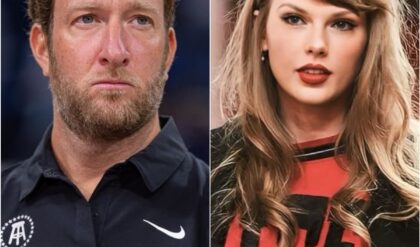Taylor Swift was unexpectedly criticized by her own op-ed author, who presented EVIDENCE claiming she doesn’t deserve the acclaim due to her ‘dirty’ private life: ‘What loving parent would want their daughter to date 12 different men in just a few years?’
Taylor Swift has plenty of songs about feminism – and her ‘f*** the patriarchy’ attitude appears to have struck a nerve with a conservative journalist.

John Mac Ghlionn was slammed for his article accusing Swift – whose Eras Tour is the highest-grossing concert tour of all time – of being a bad influence on young girls.
In the Newsweek piece titled Taylor Swift Is Not a Good Role Model, Ghilonn claimed the songstress was setting a poor example as she’s ’34.
Unmarried and childless’ – failing to call out her boyfriend, Travis Kelce, for being the same.

The op-ed writer penned the piece last week to ‘offer some pushback’ on the Taylor-mania that has swept the globe – and has been swiftly ridiculed for his ‘1950s misogynistic’ views.

In his piece, he claimed despite the popstar’s ‘talent for sparking conversations, driving engagement.

And raking in profits is commendable,’ she is not a good role model for young girls.
Commenting on Swift’s past relationships, Ghilonn suggested her martial status was crucial in shaping her as a role model, citing her not being wed as almost a sole reason girls should look elsewhere for a figure to emulate.
Although he acknowledged her ‘musical talent and business acumen,’ the researcher and essayist argued that ‘instead of encouraging young girls to see the “Swift standard” as the norm,’ they should be encouraged to aim for a romantic lifestyle that was a ‘little more… wholesome.’
‘Would any loving parent reading this want their daughter to date 12 different men in the span of just a few years?’ he argued in the piece.

‘This is not an attack on Swift; it’s a valid question that is worth asking.’
Ghilionn did not comment on the fact that Swift’s boyfriend Kelce is also unmarried and 34 – which was immediately noticed by furious readers.
Branded an ‘incel misogynist coward’ by some readers, irate users took to X, previously known as Twitter, to share their thoughts.
‘What the actual f*** is this misogynistic claptrap from @Newsweek?! Taylor Swift isn’t a role model because she’s “unmarried and childless”, what the hell? Written by a man, of course, but you should be ashamed to have published this vacuous nonsense,’ one person wrote.
‘No man has ever been chastised in the media for being a “bad role model for boys” because he was “34, unmarried and childless,”‘ another commented.

Someone else wrote: ‘Young girls do not need to aspire to marriage and children. I personally have no interest in Taylor Swift but there are worse role models than someone who evidently works hard and is financially independent and also made huge donations towards food banks.’
A fourth chimed in: ‘This man clearly doesn’t understand patriarchy. Man mansplaining feminism, patriarchy and who is and is not a female role model.’
Despite heavy backlash, some users praised Ghlionn for sharing his brash views.
‘It is a point of view. Everyone is allowed to have one. I wouldn’t want a daughter seeking out hollow fame personally. Money and adoration of the masses tend to be cold comfort in later life,’ one user wrote.

‘Personally, I absolutely love how triggered all the woke feminazis are by this,’ another snarked.
‘If there’s nothing wrong with being unmarried and childless, what are you all so angry about?’
Ghlionn has since deleted his X account.
Follow us to see more useful information, as well as to give us more motivation to update more useful information for you.
Source: CNN
Understanding Deductibles in Insurance
What is a Deductible?
A deductible is the amount of money a policyholder must pay out-of-pocket before an insurance company begins to cover the remaining costs. Deductibles are a fundamental component of most insurance policies, including health, auto, home, and business insurance.
How Do Deductibles Work?
When you file a claim, you are responsible for paying the deductible amount. Only after this amount is paid will the insurance company pay for the covered expenses exceeding the deductible. For example, if you have a $1,000 deductible on your car insurance and incur $3,000 in damages from an accident, you would pay the first $1,000, and the insurance company would cover the remaining $2,000.
Types of Deductibles
-
Fixed Dollar Deductible: This is a specific amount you must pay each time you file a claim. It’s common in health and auto insurance policies.
Percentage Deductible: In some cases, particularly with homeowners insurance, the deductible might be a percentage of the insured value. For instance, if your home is insured for $200,000 and you have a 2% deductible, your out-of-pocket cost would be $4,000 before insurance covers the rest.
Per-Claim vs. Annual Deductible:
Per-Claim Deductible: You pay the deductible every time you file a claim.
Annual Deductible: Common in health insurance, this deductible resets each year. You pay out-of-pocket until your total expenses reach the deductible amount for the year.
Why Do Deductibles Exist?
-
Cost Control: Deductibles help keep insurance premiums more affordable. Higher deductibles typically result in lower premiums because the policyholder assumes more initial risk.
Reduced Claims Frequency: Deductibles discourage policyholders from filing small or frivolous claims, reducing the number of claims an insurer must process and pay out.
Shared Responsibility: Deductibles ensure that policyholders share in the financial responsibility of their care or damages, promoting cautious behavior and maintenance of insured assets.
Choosing the Right Deductible
When selecting an insurance policy, choosing the right deductible is crucial. Here are some considerations:
-
Financial Ability: Assess your ability to pay the deductible in case of a claim. A higher deductible can lower your premium but may be challenging to pay if an incident occurs.
Risk Tolerance: Determine how much risk you are comfortable assuming. If you prefer lower out-of-pocket costs during an emergency, a lower deductible might be preferable, albeit with a higher premium.
Frequency of Claims: Consider how often you might need to file a claim. If you anticipate frequent claims, a lower deductible might be more cost-effective over time.
Impact on Premiums
The relationship between deductibles and premiums is inverse. Generally, the higher the deductible, the lower the premium, and vice versa. This trade-off allows policyholders to customize their insurance based on their financial situation and risk appetite.
Conclusion
Deductibles are a key feature of insurance policies that influence both the cost of premiums and the financial burden on policyholders when filing claims. Understanding how deductibles work and carefully selecting an appropriate deductible can help balance cost savings with financial protection, ensuring optimal insurance coverage tailored to individual needs and circumstances.





